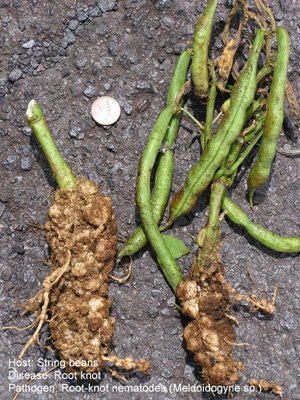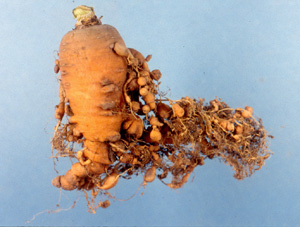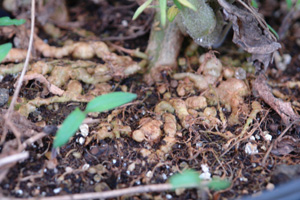Nematode, Root Knot Nematode

String beans affected with root knot nematode
Photo: Dr. Scot C. Nelson, CTAHR

Photo: Dr. Wayne Nishijima
Description
Root knot nematodes are tiny roundworms that specifically attack the roots of plants. Other types of nematodes are parasites of humans and animals. After infecting the roots of plants, root knot nematodes cause the development of knots or galls. Nematodes reduce the nutrients available to plants and thus impact the yield and viability of many crops. Infected plants may have stunted growth and wilt easily. They may be chlorotic (yellowing on leaves) and non-productive (fruit and flowers.)
Root knot nematodes cause knots to develop on the roots of the plants. These can be easily seen in some hosts; on other hosts, they appear as a slight swelling in the root, making it more difficult to diagnose. The nematodes themselves are tiny and can only be seen with the aid of a microscope.

Severely galled roots of tomato due to root knot nematode
Photo: Dr. Scot C. Nelson, CTAHR
Information
- Root knot nematode and ginger
- Root knot nematode and Pineapple: Solarization and Cover Cropping as Alternatives to Soil Fumigants for Nematode Management in Hawaii’s Pineapple Fields [SCM-29]
- Using “Tropic Sunn” sunn hemp as a cover crop against root know nematode: An Ally in the War Against Nematode Pests: Using Sunn Hemp as a Cover Crop to Suppress Root-Knot Nematodes [PD-32]
- Using Marigold: Protecting Crops From Nematode Pests: Using Marigold as an Alternative to Chemical Nematicides [PD-35]
- Sunn hemp for Soil Health and Nematode Management (YouTube video by Dr. Koon-Hui Wang)
Some plants have been found to have compounds that are toxic to nematodes. These include Sunn hemp and French marigolds. Gardeners have also found that incorporating lots of organic matter into the soil reduces the population of nematodes. Read and follow the CTAHR publications above.
When a section of the garden is infested with nematodes,consider tilling in the marigolds or sunn hemp, then allow the section of the garden to remain fallow or unplanted for a year.
Look for nematode resistant varieties. UH-CTAHR has nematode resistant tomatoes, beans and soybeans. Order seeds by mail or by phone; information and seed order form at ADCS Seed Program.
Kendal Lyon, Hawaii Island Master Gardeners

